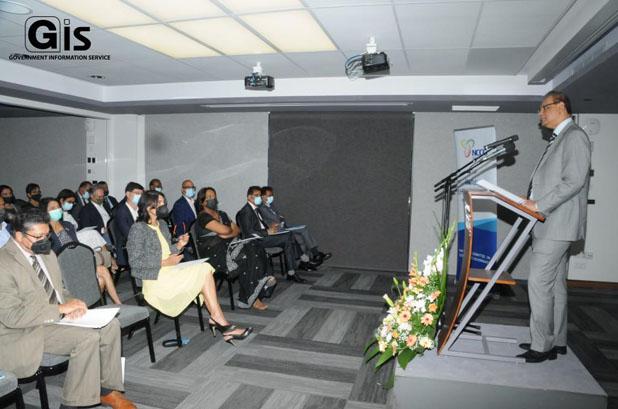Africa-Press – Mauritius. The Corporate Governance Scorecard for Mauritius, a corporate governance rating system designed to raise the standards of corporate governance practices in Mauritius, was launched, this afternoon, at the Caudan Arts Centre, Port Louis.
The Minister of Financial Services and Good Governance, Mr Mahen Kumar Seeruttun; the Pro Vice-Chancellor of the Academia, University of Mauritius, Professor Sanjeev Sobhee; and the Chair of the National Committee on Corporate Governance (NCCG), Ms Aruna Radhakeesoon, were present on that occasion.
In his address, Minister Seeruttun lauded the partnership between the University of Mauritius and the NCCG to enhance corporate governance practices in Mauritius adding that the Corporate Governance Scorecard being launched today is a key feature of this partnership. The Corporate Governance Scorecard, he highlighted, is very much part of the vision that the Government has planned for the future.
Much research and studies have been undertaken on measuring Corporate Governance and the Scorecard, developed using global principles and internationally recognised good practices such as the Organisation for Economic Co-operation and Development (OECD) Principles of Corporate Governance, is a tool to facilitate this process, he added.
Furthermore, he pointed out that the Scorecard makes commercial sense as it has been made nationally and inspired by international experiences, thus reiterating the importance of formulating “Made in Moris” products.
Mr Seeruttun recalled that he has given his full support to the NCCG, which operates within the portfolio of his Ministry, to lead the project to completion. A Framework is now in place for us to see less of Government and more of Governance, he added.
In addition, the Minister underlined that there is a keen interest from the corporate world to participate in this exercise to help companies identify where they are, where they want to go, compare their scores and progress over time, benchmark where they stand relative to peers, and facilitate fund raising efforts by bolstering investor confidence with positive scores.
On that score, he stated that there is no doubt that companies subscribing to this Framework will be characterised by a sense of mission to hold themselves to high standards of Accountability, Transparency and Sustainability, which are in turn critical for a robust and resilient economy.
As regards good governance, Mr Seeruttun emphasised that it is important for good governance to progress beyond check-the-box approaches adding that the country should aspire to reach such a stage where the Scorecard will be driving the 3 C’s namely: Conduct, Culture, and Comportment.
In this context, the Minister expressed hope that the Scorecard will help drive behaviours away from profit-at-any-cost and decision-making geared towards short-term results at the expense of long-term interests and will assist the way business is done in Boardrooms and at Shareholder meetings.
Mr Seeruttun reiterated that the Scorecard will go a very long way in strengthening the competitiveness of Mauritius and will be one of the core competencies to consolidate our reputation as an international financial centre of excellence with strong institutions and professionals of high calibre.
For his part, Professor Sobhee pointed out that the official launch of the Corporate Governance Scorecard for Mauritius comes at an opportune time as it will serve as a guiding and structured tool that will provide Corporations with an informed insight into the type of information to disclose in their annual reports and their websites to effectively and succinctly operationalise the eight principles laid out in the Code of Corporate Governance 2016 for Mauritius.
The Scorecard, he underlined, is not only ‘Made in Moris’ but is also the product of a research collaboration between the NCCG and the University of Mauritius.
The Scorecard therefore complements and reinforces the Code by providing structured, objective and research supported indicators to improve the quality of corporate governance disclosures, the Professor added.
For the Chair of the NCCG, the Scorecard is aligned with the OECD Principles of Corporate Governance as well as the Financial Action Task Force and Basel goals concerning governance practices and will objectively measure the level of compliance of Mauritian organisations with governance practices.
Furthermore, she stressed that the Scorecard will, over time, lead to greater transparency of corporate governance practices in organisations and will therefore put Mauritius amongst the few countries in the world where progress in corporate governance practices is measured in a structured, objective, and quantifiable manner.
Ms Radhakeesoon indicated that a Scorecard Yearly Report will be published by the NCCG, in which good corporate governance practices and shortcomings in governance practices as well as recommended areas of focus will be highlighted without pinpointing specific organisations.
It is the aspiration of the NCCG that over time Corporate Mauritius will gain in maturity while adding there will be no issue with individual ratings and results of organisations being made public through the Scorecard Yearly Report, she concluded. On that occasion, the NCCG also launched a User Guide to facilitate the understanding, adoption and dissemination of the Scorecard.
For More News And Analysis About Mauritius Follow Africa-Press







